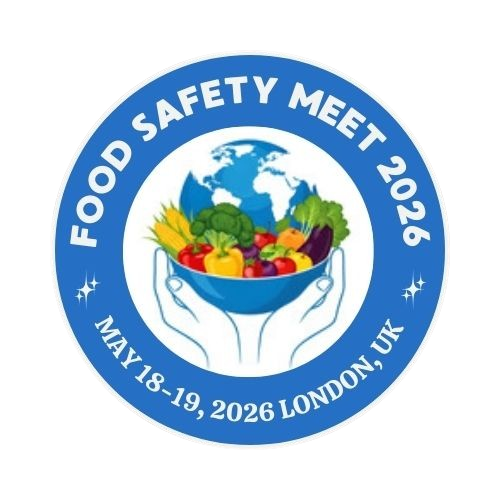Welcome Message
We are delighted to welcome participants from around the world to the “9th International Conference on Food Safety and Health,” taking place on May 18–19, 2026, in London, UK.
Centered on the theme “Transforming Food Systems for Safe Consumption and Better Well-Being,” this gathering brings together experts dedicated to strengthening global food protection. As food systems evolve, the integration of tools like genomic tracing and improved toxicokinetic modeling has become essential in identifying emerging risks. The conference encourages collaboration across research, industry, and regulatory sectors to promote innovative safety strategies and improve public well-being.
The programme will highlight advances in contaminant detection, environmental hygiene, risk assessment innovations, and surveillance methods enhanced by metabolomic profiling and microbial speciation. These developments open pathways for meaningful scientific exchange and practical application.
We look forward to welcoming you to London in May 2026 for an engaging and transformative experience that will help drive progress in global food safety and health.
Target Audience
-
Food Safety Scientists and Researchers
-
Public Health and Epidemiology Experts
-
Food Technologists and QA Professionals
-
Microbiologists and Lab Specialists
-
Nutrition and Dietetics Professionals
-
Food Manufacturing and Processing Experts
-
Agricultural and Environmental Scientists
-
Food Packaging and Material Engineers
-
Water Safety and Sanitation Specialists
-
Toxicologists and Risk Assessment Experts
-
Regulatory and Compliance Officers
-
Supply Chain and Import–Export Managers
-
Sustainability and Climate Impact Analysts
-
Academic Faculty and Educators
-
Research Scholars, Postgraduates, and PhD Students
-
Industry Leaders and Food Sector Innovators
-
Policy Makers and Government Officials
About Conference
We are excited to welcome participants from across the globe to the “9th International Conference on Food Safety and Health,” scheduled for May 18–19, 2026, in London, UK.
Guided by the theme “Transforming Food Systems for Safe Consumption and Better Well-Being,” the conference will feature a comprehensive scientific programme including keynote lectures, technical sessions, poster presentations, expert panels, and hands-on workshops. As modern food systems face increasing challenges, methods such as pathogen genomics, biochemical hazard screening, and smart biosensor integration are reshaping the landscape of preventive safety.
The event will explore emerging trends in analytical toxicology, foodborne disease epidemiology, safety engineering, processing innovations, and sustainability-focused approaches supported by predictive microbiology. Special attention will be given to applying evidence-based frameworks and advanced monitoring technologies to minimize contamination risks and enhance consumer protection.
Professionals, academicians, students, and policymakers are invited to join, share insights, and participate in collaborative discussions. Opportunities for networking and recognition through awards will also be available.
Join us in London in May 2026 for an inspiring and impactful event that will contribute to safer food systems and improved global health.
Why to Attend
The 9th International Conference on Food Safety and Health 2026 serves as a leading global forum uniting food scientists, public health professionals, microbiologists, nutrition experts, and industry specialists committed to advancing safer and healthier food systems. Over two enriching days, attendees will explore emerging developments in contamination control, foodborne disease prevention, regulatory science, toxicology, and sustainable safety strategies supported by tools such as metagenomic sequencing and hazard quantification.
The conference offers a dynamic platform to present research findings, exchange technical insights, and collaborate with experts shaping modern food protection frameworks. Participants will gain practical knowledge on microbial risk mitigation, processing safety, environmental monitoring, nutrition–health interactions, and innovative technologies such as biosensor diagnostics and quantitative exposure modeling, which are transforming food safety operations globally.
Whether you are an academic, industry professional, policymaker, or research student, this event provides exceptional opportunities to deepen expertise, strengthen professional networks, and stay aligned with the evolving scientific landscape of food safety and public health.
Conference Highlights
-
Global Leaders in Food Safety on One Platform: Hear insights from renowned experts advancing food microbiology, toxicology, epidemiology, nutritional safety, and emerging innovations in contaminant profiling and exposure science.
-
Hands-On Workshops & Technical Demonstrations: Participate in interactive sessions covering pathogen detection methods, food testing technologies, hygiene engineering, risk evaluation tools, and modern surveillance supported by analytical biochemistry.
-
Expert Symposiums on Emerging Safety Challenges: Engage in discussions on antimicrobial resistance, climate-driven contamination patterns, foodborne disease modeling, environmental hazards, and next-generation preventive strategies.
-
Food Technology & Innovation Expo: Explore cutting-edge safety solutions, processing equipment, rapid detection tools, smart packaging systems, environmental monitoring devices, and automation technologies showcased by industry leaders.
-
Young Researchers & Early-Career Scientists Forum: A dedicated stage for presenting original studies in food safety, microbial ecology, health risk analysis, and quality control, with opportunities for mentorship and expert feedback.
-
Networking & Collaboration Hub: Connect with researchers, health agencies, regulatory bodies, industry professionals, and innovators to build partnerships, explore collaborative projects, and share knowledge across sectors.
-
Awards for Excellence in Food Safety Research: Celebrate outstanding contributions through recognitions such as Best Research Paper, Emerging Scientist Award, Best Poster Presentation, and Innovation in Food Safety Technology.
Sessions and Tracks
Food systems often encounter invisible contamination during handling and storage, especially when biofilm layers begin forming. Unexpected shifts in the microbiome change how pathogens survive on surfaces as metagenomic variation increases. Many studies now incorporate PCR mapping to locate risk zones. Equipment corners trap moisture, allowing bioindicators to accumulate as microflora adapts. New sanitation layouts aim to reduce microbial persistence.
Focus Areas:
-
Microbial Risk Indicators
-
Surface Contamination Hotspots
-
Moisture-Driven Pathogen Spread
Foodborne outbreaks continue to challenge public health networks as virulence patterns evolve. Investigators rely on serotyping results to track pathogens and analyze antimicrobial resistance influenced by genomic shifts. Predictive epidemiological models help forecast infection clusters using phylogenetic associations. Variants with stronger virulence factors spread faster. Global coordination improves emergency response systems.
Research Themes:
-
Outbreak Data Interpretation
-
Disease Transmission Forecasting
-
Community-Level Exposure Mapping
Testing laboratories increasingly depend on high-resolution tools such as chromatography for residue detection. Portable sensors enhanced with nanomaterials help identify microscopic contaminants more accurately. Many diagnostic platforms include metabolomics insight for spoilage prediction. Real-time data systems speed up decision-making during inspections. Sensitivity improvement helps reduce false-negative outcomes across diverse foods.
Key Areas:
-
Rapid Testing Technologies
-
Contaminant Detection Tools
-
Diagnostic Accuracy Enhancements
Modern packaging systems rely on innovations such as polymer barriers that limit chemical migration. Temperature-responsive indicators are increasingly paired with nanocoating films to monitor freshness. Researchers evaluate material stability using spectroscopic analysis to detect unwanted reactions. Packaging efficiency strongly influences shelf-life outcomes across global supply chains. Safer alternatives are being developed to reduce environmental footprint.
Focus Topics:
-
Smart Packaging Technologies
-
Migration Control Solutions
-
Shelf-Life Optimization
Track 5: Chemical Contaminants & Residue Monitoring
Food products can accumulate trace contaminants through environmental exposure and processing steps, especially when xenobiotic compounds persist. Laboratories rely on monitoring protocols to prevent toxic buildup. Predictive models analyze how mass spectrometry to detect these residues with high precision. Regulatory thresholds guide biochemical interactions influence contaminant stability. Awareness improves compliance across manufacturing sectors.
Monitoring Priorities:
-
Residue Detection Analytics
-
Threshold Evaluation Methods
-
Toxicity Risk Assessment
Functional foods are gaining attention as researchers explore how bioactive compounds influence long-term health. Enhanced nutrient profiling uses metabolic markers to understand absorption efficiency. Many diets now incorporate fortified ingredients to address deficiency trends. Studies examine how oxidative stress reduction improves immune resilience. Consumer awareness continues to shift toward evidence-based nutritional choices.
Key Directions:
-
Functional Ingredient Evaluation
-
Nutrient Absorption Studies
-
Health-Promoting Food Development
International frameworks rely on updated toxicological assessments to determine safe consumption levels. Regulatory agencies coordinate harmonized safety rules supported by risk-assessment models. Compliance auditing ensures that global food trade meets stringent requirements. Advances in analytical verification help validate imported products. Transparent guidelines allow smoother transitions for emerging markets.
Compliance Areas:
-
Safety Standard Harmonization
-
Regulatory Auditing Systems
-
Global Trade Verification
Food manufacturers work to reduce cross-contact risks as immunogenic proteins can trigger severe reactions. Improved testing uses ELISA and molecular tools to detect allergen traces. Packaging transparency assists families in avoiding hidden ingredients. Researchers study hypersensitivity patterns to refine threshold guidelines. Clear labeling policies improve trust in both local and international markets.
Protection Priorities:
-
Allergen Detection Techniques
-
Cross-Contact Prevention Methods
-
Sensitive Consumer Labeling
Sanitation protocols now integrate biocidal formulations to increase cleaning efficiency. Facility layouts are optimized using microbial flow analysis to reduce contamination spread. Automated systems that dispense disinfectants maintain consistent hygiene levels. Studies show how aerobic survival pockets affect post-cleaning outcomes. Routine audits improve accountability across processing zones.
Sanitation Focus:
-
Cleaning Efficiency Improvements
-
Facility Design Optimization
-
Environmental Hygiene Monitoring
Toxicological studies explore how carcinogenic and mutagenic substances form during certain processing steps. Risk experts analyze biotransformation pathways that alter chemical behavior in the body. New hazard-mapping models predict exposure peaks in supply chains. Regulatory bodies evaluate scientific evidence to update safety limits. Continuous training ensures workforce competency in handling toxic risks.
Hazard Themes:
-
Chemical Hazard Mapping
-
Exposure Assessment Frameworks
-
Toxicity Evaluation Techniques
Sustainable systems aim to reduce environmental impact while maintaining ecosystem stability. Researchers study biogeochemical cycles to balance nutrient loss and replenishment. Cleaner production reduces waste and enhances energy efficiency. Assessments involving carbon metrics encourage climate-friendly innovations. Circular models support long-term resilience across food operations.
Sustainability Goals:
-
Resource-Efficient Production
-
Low-Emission Strategies
-
Waste Reduction Approaches
Food processors rely on high-quality water free from pathogenic intrusions that can impact product safety. Filtration technologies using membrane systems help remove microscopic contaminants. Monitoring turbidity changes provides early warnings of quality breaches. Proper treatment ensures consistent performance across production lines. Integrated controls protect both food and environmental health.
Quality Control Points:
-
Water Purification Methods
-
Contaminant Monitoring Systems
-
Processing-Grade Water Standards
Quantitative models use probabilistic calculations to evaluate potential food safety outcomes. Data scientists integrate stochastic variables to capture realistic risk behaviors. Simulations highlight weaknesses in supply chains that may increase hazard exposure. Advanced algorithmic forecasting supports timely mitigation. Decision-makers use these insights to prioritize stronger preventive measures.
Assessment Tracks:
-
Predictive Risk Modelling
-
Scenario-Based Evaluation
-
Hazard Probability Analysis
GM technology uses transgenic methods to enhance crop performance and resistance. Safety evaluations test genomic stability to ensure alterations do not produce harmful compounds. Regulatory panels assess phenotypic consistency before approval. Public trust depends on transparent communication about benefits and risks. Studies continue to refine long-term dietary safety predictions.
Evaluation Pillars:
-
Genetic Stability Testing
-
Regulatory Review Processes
-
Consumer Safety Validation
Complex food networks require monitoring to prevent adulteration and fraud. Blockchain systems authenticate sourcing backed by traceability metrics. Analytical labs use spectrometric tools to verify product identity. Visibility across suppliers strengthens trust and reduces counterfeit incidents. Proactive screening minimizes disruptions during global transport.
Integrity Focus:
-
Authenticity Verification
-
Supplier Transparency Measures
-
Fraud Prevention Tools
Processing innovations use thermodynamic principles to optimize safe heat treatments. Engineers measure rheological behavior to refine product texture and consistency. High-pressure systems inactivate pathogens without compromising nutrients. Cryogenic techniques advance frozen preservation. Modern plants integrate sensors for real-time safety control.
Processing Elements:
-
Thermal & Non-Thermal Methods
-
Equipment Performance Analysis
-
Quality-Safety Balancing
New pathogens exhibit evolving genotypic traits that complicate detection and control. Global mobility accelerates epidemiological shifts in foodborne threats. Continuous surveillance helps identify unusual outbreak patterns early. Research explores how climate stressors influence pathogen behavior. Preparedness frameworks outline rapid-response strategies.
Threat Categories:
-
Novel Pathogen Identification
-
Global Spread Mechanisms
-
Early Warning Systems
Spoilage organisms adapt quickly through enzymatic activity that degrades food quality. Scientists analyze microbial succession to understand shelf-life limitations. Predictive models incorporate physiological stress responses to examine growth. Packaging interventions help slow spoilage onset. Continuous sampling maintains assurance across storage periods.
Spoilage Areas:
-
Shelf-Life Prediction
-
Microbial Growth Behaviour
-
Freshness Preservation
Track 19: Consumer Awareness & Food Safety Education
Education campaigns explain how microbial hazards develop when handling practices decline, helping consumers understand factors that increase pathogen load. Digital platforms distribute evidence-based tips for home safety, while researchers use hazard analysis and microbial risk assessment to study behavioral trends and refine communication strategies. Awareness initiatives reduce preventable contamination at the consumer level, and collaboration with schools strengthens early food safety habits.
Awareness Tracks:
-
Public Safety Communication
-
Behavioural Insight Application
-
Consumer Training Tools
Track 20: Climate Change & Food Safety Challenges
Climate variability influences ecophysiological responses in crops and pathogens. Warmer environments support faster sporulation of harmful organisms. Supply chains face instability as hydrological patterns shift. Changing temperatures alter microbial survival in food systems. Preparedness strategies adapt to emerging climate-linked risks.
Challenge Points:
-
Temperature-Driven Hazard Shifts
-
Environmental Impact Assessment
-
Climate-Resilient Food Systems
Market Analysis
The Food Safety and Health & Wellness markets are experiencing strong and sustained growth, driven by rising consumer awareness, stricter global regulations, and rapid advancements in testing technologies and digital health solutions. The global food safety testing market is projected to reach USD 40–48 billion by 2030, growing at a CAGR of 7–8%, fueled by increased foodborne illness cases, compliance requirements, and the adoption of rapid testing methods. Meanwhile, the broader Health & Wellness market is expanding toward USD 7–8 trillion by 2030, supported by preventive health demand, personalized nutrition, functional foods, and digital health ecosystems.
Technology integration—particularly AI, IoT sensors, blockchain traceability, and rapid molecular testing—is reshaping safety and health monitoring by providing faster detection, real-time insights, and transparent supply chains. Governments across North America, Europe, and Asia-Pacific are tightening safety standards, driving mandatory testing and boosting investments in laboratory services, digital health, and contamination-prevention technologies. Consumer-driven trends toward clean-label products, immunity-boosting foods, and lifestyle-based wellness solutions continue to accelerate market adoption. Overall, food safety and health markets are set for sustained, multi-trillion-dollar growth over the next decade, driven by regulation, consumer behavior, and technological innovation.
Global Food Safety Testing Market:
The graph shows a steady rise in the global food safety testing market from 2023 to 2030. The market grows from USD 26 billion to over USD 43 billion, reflecting strong annual growth. This upward trend is driven by stricter regulations, increased foodborne illness cases, and the adoption of rapid testing technologies. Overall, the graph highlights the increasing global focus on ensuring safer food supply chains.

Global Health & Wellness Market:
The graph displays consistent growth in the global health and wellness market, rising from USD 5.6 trillion in 2023 to USD 7.7 trillion by 2030. The trend reflects rising consumer demand for preventive health, personalized nutrition, and digital health solutions. The market’s steady expansion shows how wellness is becoming a major global priority.

Abstract Submission and Registration
Experts, researchers, industry professionals, and academics working in food safety, public health, nutrition, toxicology, contamination control, and food quality systems are invited to submit their latest findings to the 9th International Conference on Food Safety and Health. Submissions may include research abstracts, full papers, case studies, posters, or e-posters that align with the conference themes.
Abstract Guidelines
-
Abstracts must be written in English and limited to 500 words.
-
The title should be in sentence case and clearly represent the work presented.
-
Provide full details of all authors, including name, affiliation, and designation.
-
A brief biography of the presenting author (up to 150 words) and a professional photograph should be included.
-
Topics may cover foodborne diseases, risk assessment, testing technologies, nutrition and wellness, hygiene practices, regulatory frameworks, sustainability, and emerging food safety challenges.
Review Process:
All abstracts will be reviewed by the Scientific Committee. Authors will be informed of acceptance or revision requirements within 24–48 hours. Approved abstracts may be selected for oral talks, poster displays, or special thematic sessions.
Publication:
Accepted abstracts will be published in the official conference proceedings and may also be considered for partner journals or special food safety and health bulletins.
Abstract link : https://foodsafety.nutritionalconference.com/abstract-submission.php
Registration:
After receiving an acceptance confirmation, participants must register through the conference Registration portal. Early registration ensures access to keynote lectures, workshops, networking sessions, and conference materials.
Registration link : https://foodsafety.nutritionalconference.com/registration.php
Visa Guidelines
The organizing committee does not directly handle UK visa applications, but participants can request official documents to support their UK Standard Visitor Visa for conference attendance.
Upon request, the following documents can be provided:
Visa requirements vary depending on your nationality and the policies of the UK Embassy or Consulate in your region.
Invitation Letter:
This letter verifies your participation in the conference through either accepted research or completed registration. It may be used as part of your visa submission, but its issuance does not guarantee visa approval, as all decisions are made by UK immigration authorities.
Visa Support Contact:
For assistance with visa documentation, contact: meevents@memeetings.com
Past Conference
The 8th International Conference on Food Safety and Health, held in Amsterdam in February 2025, brought together leading researchers, industry professionals, and public-health experts to address pressing challenges in global food safety. The event provided a forum for sharing research findings, innovative technologies, and policy solutions aimed at strengthening food protection systems worldwide.
Conference Focus:
Sessions covered a broad range of topics including foodborne pathogens, contamination prevention, microbial and chemical safety, smart packaging, and supply-chain integrity. Special attention was given to rapid detection technologies, IoT-based monitoring, digital traceability, and sustainable practices that enhance food safety across the value chain.
Participants & Expertise:
The conference attracted food scientists, microbiologists, toxicologists, quality-assurance specialists, regulatory representatives, nutrition researchers, and graduate students. Attendees engaged in technical discussions, poster sessions, and workshops designed to promote collaboration and the practical application of research in industry and policy settings.
International Speaker Representation:
Speakers and panelists hailed from several countries, including Egypt, India, Lebanon, Brazil, Macedonia, and the United Arab Emirates. Their presentations offered diverse regional perspectives on food technology, nutrition, safety regulation, and innovations for resilient food systems.












